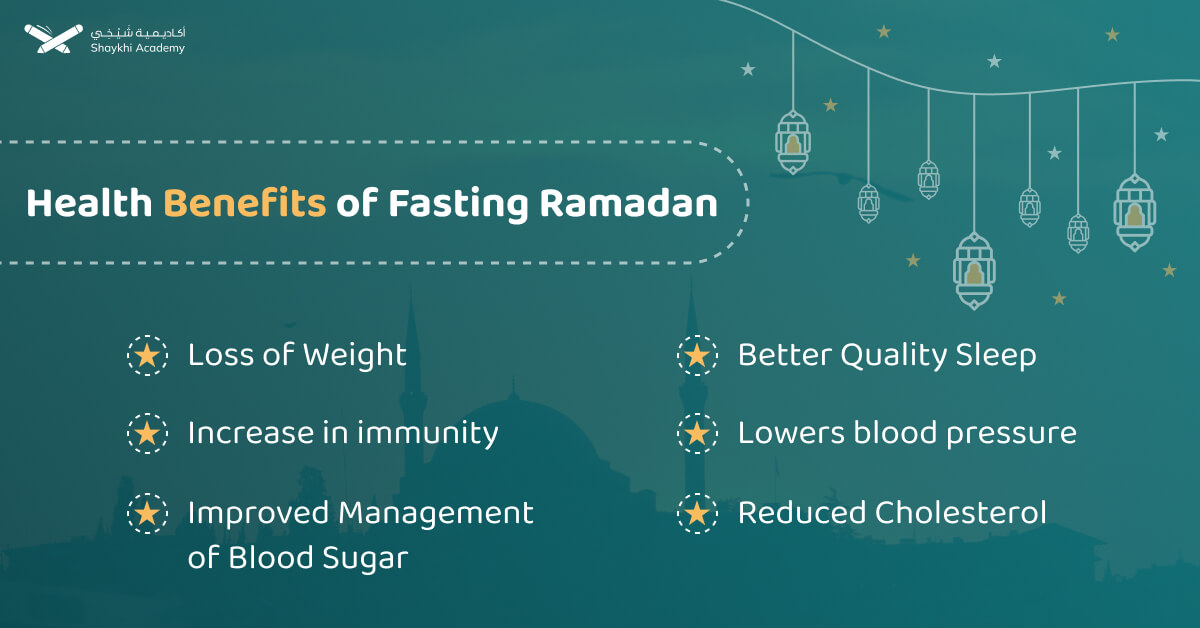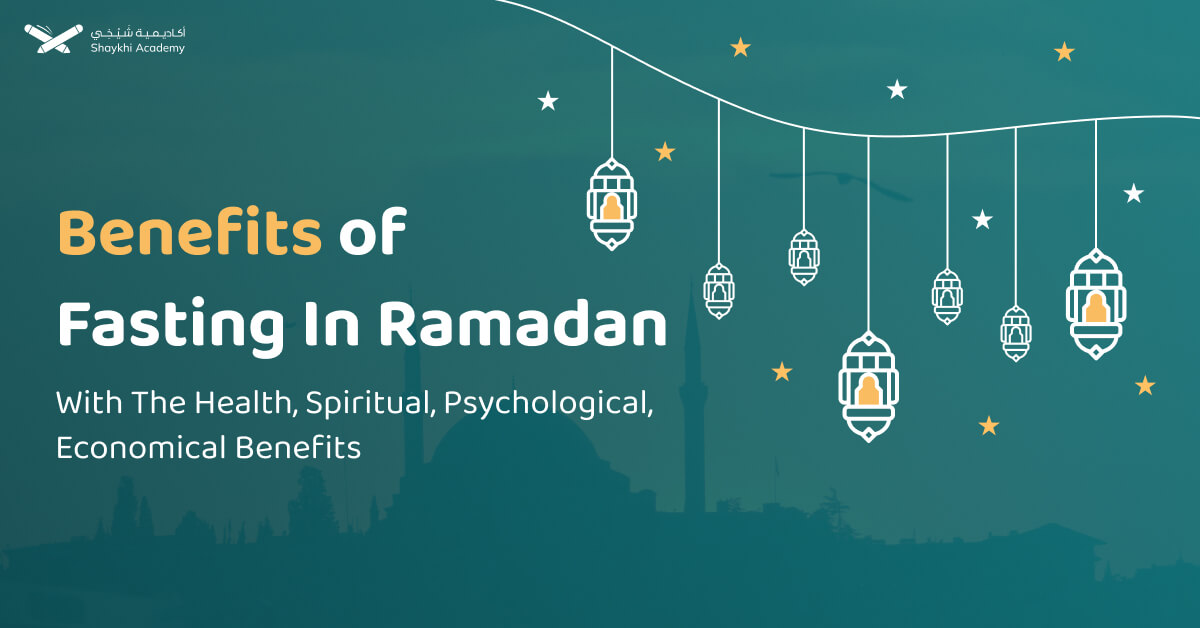There are many benefits of fasting in Ramadan; including physical health improvements such as weight loss, better blood sugar control, and enhanced immunity. It also fosters spiritual growth, promoting qualities like patience, gratitude, and empathy. Additionally, Ramadan encourages psychological well-being by promoting self-discipline, reducing stress, and strengthening social connections.
For Muslims worldwide, Ramadan is a sacred month. In a lunar month, they observe 29 or 30 days of fasting, keeping their fast from sunrise to sunset. Fasting during Ramadan offers several advantages beyond spiritual benefits, such as improved emotional health and well-being, mental and physical. Understanding the significance, benefits, and meaning of fasting throughout the month of Ramadan is crucial for Muslims.
Blessings And Benefits of Fasting in Ramadan
Fasting during Ramadan offers numerous benefits, encompassing health, spiritual, psychological, and even economic dimensions. The significance of Ramadan extends beyond its religious observance, impacting individuals on multiple levels.
Health Benefits: Fasting during Ramadan can lead to weight loss, improved metabolism, better blood sugar control, enhanced immune function, and lowered blood pressure and cholesterol levels. Additionally, it provides an opportunity for the digestive system to rest and detoxify.
Spiritual Benefits: Ramadan fosters spiritual growth by promoting piety, gratitude, empathy, and self-discipline. It deepens the connection with the Creator, increases awareness of one’s actions, and offers opportunities for repentance and forgiveness.
Psychological Benefits: Fasting promotes self-control, gratitude, compassion, and emotional well-being. It encourages reflection, reduces stress and anxiety, and strengthens social ties within communities.
Economic Benefits: Ramadan encourages moderation and simplicity, leading to a reduction in consumerism and materialism. It emphasizes charity and generosity, supporting those in need through acts of giving and Zakat.
Benefs of fasting in Ramadan extend beyond the individual to encompass broader societal and economic dimensions, fostering a culture of compassion, gratitude, and social responsibility. Through fasting and spiritual devotion, Muslims strive to deepen their faith, strengthen their character, and contribute positively to their communities and the world at large.
Is fasting for Ramadan healthy?
It is generally healthy to fast in Ramadan. But studies on the health implications of fasting during Ramadan have produced conflicting results, most likely due to variations in the fast’s duration the local weather of the nation, and the season in which it is performed.
Obese or overweight persons lose weight and body fat during Ramadan, according to several research. If you are overweight and want to lose weight and keep it off, you may be able to retain the weight you lose from fasting if you make preparations to eat a nutritious diet and then get active after Ramadan.
While some small studies revealed no effect, others examined the impact of Ramadan fasting on blood lipid and cholesterol levels and reported a temporary benefit in certain situations.
Additionally, a few modest studies have suggested that fasting during Ramadan can benefit the immune system in the near term. Further study is required to corroborate the mixed outcomes of the investigations conducted in both circumstances.

Health Benefits of Fasting Ramadan
The medical benefits of fasting in Ramadan and the health benefits are two destinations for one coin. There are several benefits of fasting in Ramadan. According to studies, fasting can help lower blood sugar, lessen inflammation, and enhance heart health in general. Fasting enhances sleep quality and helps control the circadian cycle. Aslo read: Ramadan medication rules.
Ramadan fasting offers the digestive system a chance to recuperate and renew itself. It may lower the chance of gastrointestinal conditions including acid reflux and irritable bowel syndrome and aid in the improvement of gut health. The following are a few Ramadan advantages fasting for your health and well-being:
1. Loss of Weight and Enhanced Metabolism
The first health benefits of fasting in Ramadan are enhanced metabolism and weight reduction. The body begins to use fat reserves as a source of energy and uses them when it becomes used to consuming less food and liquids over the day. The body burns fat and loses weight as a result, and its metabolism may also speed up and become more effective at burning calories.
2. Improved Management of Blood Sugar
By decreasing insulin resistance and increasing insulin sensitivity, fasting can aid in blood sugar regulation. Fasting lowers blood sugar levels because it forces the body to consume glucose that has been saved for energy.
Additionally, while inflammation plays a role in insulin resistance, fasting can help lower inflammation in the body. Furthermore, since extra body fat can result in insulin resistance and elevated blood sugar, fasting can aid in weight loss, which is crucial for blood sugar regulation.
3. Increase in immunity with benefits of fasting in Ramadan
Fasting is a powerful immune-boosting strategy. Antioxidants are produced in greater quantities and pro-inflammatory cytokines are produced less when inflammation and oxidative stress are reduced, aiding in the prevention of sickness and disease.
Nutritionists claim that fasting facilitates cleaning and strengthens the intestinal lining. Additionally, it can encourage autophagy, a process by which cells rid themselves of defective and hazardous elements.
4. Better Quality Sleep
There are several ways that fasting may aid with sleep improvement. For example, it has been demonstrated that fasting lowers cortisol levels, a stress hormone that can disrupt sleep. The benefits of Ramadan and fasting are also that it has been connected to a rise in the hormone melatonin, which promotes sleep.
Additionally, it could aid in the regulation of circadian rhythms, which are the natural 24-hour cycles that control several bodily physiological functions, including sleep. Fasting can enhance the quantity and quality of sleep by restoring the body’s natural rhythms to balance with the sleep-wake cycle.
5. Lowers blood pressure
It has been demonstrated that fasting lowers blood pressure via lowering inflammation, which raises blood pressure, and the body’s salt content. Additionally, it encourages weight reduction, which can help decrease blood pressure even more. Furthermore, it has been shown that fasting enhances insulin sensitivity, which is linked to a reduction in blood pressure.
6. Reduced Cholesterol
We all know that one of the possible physical effects of fasting during Ramadan is weight reduction, but several other positive changes are occurring in the background. A group of cardiologists discovered that those who observe Ramadan had a favorable impact on their lipid profile or that blood cholesterol levels are lower.
Lower blood cholesterol improves cardiovascular health and significantly lowers the chance of developing heart disease, having a heart attack, or having a stroke. Furthermore, maintaining your newly decreased cholesterol level should be simple if you resume a balanced diet following Ramadan.
7. Cleanse & Detoxify
One important benefits of fasting in Ramadan is Detoxify. Ramadan is an excellent time to cleanse your body and soul, and it’s also a terrific time to detoxify. By not eating or drinking during the day your body will be provided the uncommon chance to cleanse your digestive system throughout the month.
In the process of burning fat deposits for energy, your body will also burn off any potentially dangerous pollutants that may be stored there. This body cleanse is an excellent way to start a consistently healthy lifestyle since it will leave you with a clean slate.
Spiritual benefits of fasting in Ramadan:
Muslims fast throughout Ramadan mainly as a spiritual activity to deepen their relationship with the Creator enhance their faith, and achieve the benefits of fasting in Ramadan. Fasting during the day serves as a reminder of the struggles that many individuals deal with daily. Muslims think that by fasting, they might develop greater empathy for other people and become more giving.
Furthermore, Muslims learn patience, discipline, and self-control by fasting in Ramadan. It is an opportunity to consider one’s deeds, confess one’s sins, and ask Allah for forgiveness. Muslims think that going without food helps cleanse the spirit and draws one closer to Allah. Let’s see the most important spiritual Benefits of Fasting in Ramadan:
1. Boosts Taqwa
The Islamic term “taqwa” means “piety and dread of God,” as well as awareness of Allah and the truth. The holy text of the Quran has many uses of the word. Because the angels are always watching over us, it conveys a strong feeling of caution about our own lives and deeds.
Fasting also improves one’s capacity to help one refrain from inadvertent transgressions of His ways. People follow the route away from sins and wrongdoings as a result.
2. Fetches larger compensation and rewards
During Ramadan, Muslims who can do so must fast to achieve the benefits of fasting in Ramadan. It is stated that Allah bestows enormous favors and rewards on those who fast. People are getting closer to seeing Allah in the hereafter with every hour they spend fasting. However, instead of fasting for the presents, one should concentrate on their importance and worth.
3. Prevents Hellfire and leads to heaven
On the Day of Resurrection, only those who fasted during Ramadan will be permitted to pass through the Ar-Rayyan gate into heaven. In anticipation of Ramadan, the virtue encourages individuals to increase the number of voluntary fasts they observe. Muslim scholars say that a person can be transported from Hellfire to Jannah with just one day of fasting.
Psychological Benefits of Fasting Ramadan
Ramadan offers enormous psychological advantages, which heighten the significance of this auspicious month. Self-control, empathy, and compassion are among the many psychological advantages of Ramadan, along with enhanced well-being and elevated happiness.
The emotional significance and psychological advantages of the holy month of Ramadan will be discussed in the following paragraphs:
1. Enhanced self-control
Benefit of fasting in Ramadan is a terrific chance to practice self-discipline through Ramadan. In other words, it’s a type of worship that necessitates fasting from food and liquids from sunrise until sunset. Developing self-control and the capacity to withstand our desires are further benefits of fasting.
Furthermore, there are tremendous benefits to intensifying our acts of prayer throughout Ramadan, which helps to deepen our relationship with Allah (SWT). Islam therefore exhorts Muslims to increase their good actions to elevate their souls. This might therefore strengthen their self-discipline.
2. An elevated feeling of thankfulness and gratitude
Reflecting on the many gifts and plenty we are bestowed with throughout our lives is encouraged during Ramadan. We may be more grateful for the little things in life by giving up all material pleasures and vices, including eating and drinking.
Similar to this, fasting encourages us to appreciate the small pleasures in life and to be conscious of others who are less fortunate. Giving to charitable organizations that help the less fortunate members of society may undoubtedly increase our sense of appreciation.
3. Enhanced compassion and empathy
By making individuals aware of the less disadvantaged areas that require their assistance, Ramadan can increase empathy and compassion in people.
We will be more sympathetic and caring toward other impoverished groups if we are aware of their predicament. Ramadan, then, is a great chance for us to reflect on the struggles that those marginalized people deal with daily.
4. Decreased sadness and anxiety
Ramadan encourages us to develop healthier habits, such as eating better food, getting enough sleep, and exercising more, which can help us combat our anxiety and despair. These types of pursuits and lifestyle modifications may undoubtedly have a very favorable effect on our mental well-being.
In other words, these behaviors can improve our moods and lessen the bad feelings that could cause sadness. Furthermore, strengthening our spirituality and our relationship with Allah, the Almighty would assist us in lowering our stress and anxiety levels.
Since we may share iftar with our loved ones in Ramadan, we can strengthen our ties to one another and our families. Therefore, strengthening our social ties has a major positive influence on our general well-being and happiness.
5. Enhanced emotions and better emotional control
Our awareness of life’s realities and inner tranquility can be enhanced by fasting at Ramadan and enhancing our good acts, such as prayer, remembering Allah, and reading the Qur’an.
Additionally, by providing us with opportunities for introspection and awareness, Ramadan might aid us in strengthening our ability to control our emotions.
The benefits of fasting during Ramadan, in particular, can encourage us to pause and consider our spiritual and emotional lives, which can lead to increased appreciation and compassion.
Furthermore, because it pushes us to alter our eating patterns, fasting is seen as a type of self-care that boosts our mood and restores our vitality.
6. Enhanced spiritual bond
By offering Taraweeh prayer and frequent prayers, Muslims can deepen their spiritual connection to Allah (SWT). They can also increase other acts of devotion, such as reading the Qur’an and remembering Allah (SWT).
Engaging in such activities from the benefits of fasting in Ramadan, can greatly strengthen our spiritual bond with Allah, the Almighty.
Furthermore, Ramadan enables Muslims to strengthen their relationships with those in their community and donate to charitable causes to better the lives of others—practices that have the potential to elevate our spiritual condition.
Economic benefits of fasting Ramadan
There are several financial advantages to fasting, such as: A thorough understanding of the fasting’s dimensions reveals the benefits of the practice and the implications of forcing it upon humanity; the economic dimension is one of the most notable aspects of the fasting obligation. Among the numerous economic benefits of fasting in Islam is:
- Its ability to cleanse spirits from the damage caused by a culture of consumerism.
- Economics and Rationalization.
- The ransom
- Zakat al-Fitr
- Allocate additional time for labor and output.
Unlock the Path to Quranic Mastery with Shaykhi Academy!
Are you seeking the finest Quranic education right from the comfort of your home? Look no further! Shaykhi Academy stands out as a premier online Quran learning platform, dedicated to providing exemplary education to both children and adults.
Why Choose Shaykhi Academy?
- Connect with highly qualified native tutors.
- Flexible scheduling to suit your busy lifestyle.
- Affordable classes tailored for all levels.
- Accessible from anywhere around the globe.
Discover Our Range of Courses:
- Arabic Noorani Qaida: Lay a solid foundation for Quranic studies.
- Online Quran Classes for Kids: Engaging lessons for lifelong learning.
- Tajweed Rules for Kids: Learn to recite with confidence.
- Quran Hifz for Kids: Step-by-step guidance to memorize the Quran.
- Quran for Adults: Introduce yourself to Quran reading and Tajweed rules.
- Online Arabic Courses: Master the language of the Quran.
- Islamic Studies: A wide range of topics related to Islam, including theology, law, Quranic studies, Hadith.
Don’t Miss Out on Your Chance to Excel!
Whether you’re a beginner or seeking advanced knowledge, Shaykhi Academy can guide you! Book your free trial now and make Ramadan 2024 your Quranic turning point!
Conclusion:
In conclusion, fasting during Ramadan offers a range of benefits, including improved physical health, spiritual growth, emotional well-being, and social cohesion. It promotes self-discipline, gratitude, and empathy while fostering a sense of community and generosity. Ramadan is a time for personal reflection, growth, and positive transformation, impacting individuals and society at large in profound ways.

































